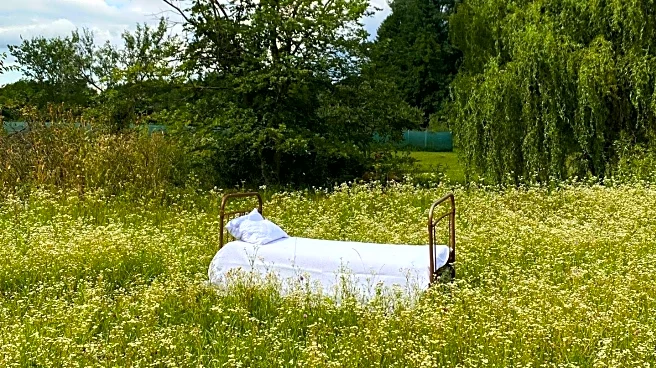What's Happening?
A recent article on Literary Hub discusses the mental health benefits of engaging with nature, drawing insights from Katja Pantzar's experiences in Finland. Pantzar, a Canadian author, shares her journey of overcoming depression and anxiety by adopting Finnish lifestyle practices that emphasize regular interaction with nature. These practices include activities like biking, cold plunges, and 'forest therapy,' which have been shown to improve mental health. The article also references the concept of 'sisu,' a Finnish term for grit and perseverance, which Pantzar embraced as part of her healing process. The narrative highlights the broader cultural practices in Nordic countries, where spending time in nature is integral to daily life and is associated with higher levels of happiness and wellbeing.
Why It's Important?
The exploration of nature's role in mental health is significant as it offers a non-pharmaceutical approach to improving wellbeing, which could be particularly beneficial in the U.S., where depression rates have been rising. The article suggests that integrating nature into daily routines could serve as a preventive measure against mental health issues. This perspective aligns with growing interest in holistic health practices and could influence public health policies and individual lifestyle choices. The potential for nature-based therapies to reduce healthcare costs and improve quality of life presents a compelling case for further research and implementation in diverse settings.
What's Next?
As awareness of nature's benefits on mental health grows, there may be increased advocacy for urban planning that incorporates green spaces and nature access. Public health campaigns could promote outdoor activities as part of mental health strategies. Additionally, further studies could explore the specific mechanisms by which nature impacts mental health, potentially leading to new therapeutic approaches. Stakeholders such as healthcare providers, policymakers, and community organizations might collaborate to create environments that facilitate regular interaction with nature.
Beyond the Headlines
The cultural dimension of nature's impact on mental health, as seen in Nordic countries, raises questions about how cultural practices influence wellbeing. The concept of 'sisu' and its role in resilience could inspire similar cultural adaptations in other regions. Moreover, the environmental aspect of this discussion highlights the importance of preserving natural spaces, not only for ecological reasons but also for their potential health benefits. This intersection of environmental and health advocacy could lead to more integrated approaches to sustainability and public health.









